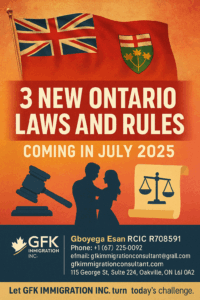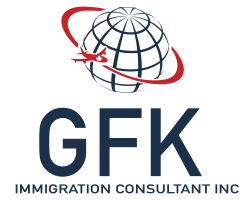
New Ontario Laws and Rules Coming In July
As July 2025 approaches, 3 new Ontario laws are rolling out that will reshape the lives of tenants, gig workers, and individuals with disabilities.
From a groundbreaking bylaw to combat “renovictions” in Toronto to new protections for digital platform workers and the introduction of the new Canada Disability Benefit, these changes are poised to have a significant impact.
Whether you’re a renter facing eviction, a gig worker driving for Uber, or someone seeking financial support for a disability, these new rules could affect you.
Table of Contents
Toronto’s Renoviction Bylaw: Protecting Tenants from Unfair Evictions
Digital Platform Workers’ Rights Act: Empowering Gig Workers
Canada Disability Benefit: Financial Support for Canadians with Disabilities
Why These Changes Matter
How to Prepare for The New Ontario Laws
Toronto’s Renoviction Bylaw: Protecting Tenants from Unfair Evictions
Starting July 31, 2025, Toronto’s Rental Renovation Licence Bylaw will take effect, a landmark measure designed to curb “renovictions”, a term describing bad-faith evictions where landlords use renovations as a pretext to displace tenants, raise rents illegally, or prevent tenants from returning to their homes.
This bylaw, inspired by a successful 2024 Hamilton regulation, addresses Toronto’s escalating rental crisis, where affordable housing is increasingly scarce, and renovictions contribute to tenant displacement and rising homelessness.
Under the new bylaw, landlords must obtain a Rental Renovation Licence before issuing an N13 notice (a provincial eviction notice for renovations requiring vacant possession).
To secure this licence, landlords must meet strict requirements, ensuring transparency and fairness for tenants. These include:
Pre-Renovation Requirements:
Landlords must secure all necessary building permits and have a qualified professional, licensed by the Ontario Association of Architects (OAA) or Professional Engineers Ontario (PEO), confirm that the renovation requires the unit to be vacant.
Tenant Notification and Support:
Landlords must notify tenants of the renovation plans, provide compensation or alternative accommodation options, and offer tenants the right to return to their original rental unit at the same rent once the renovations are complete.
Compensation Options:
If tenants choose to return, landlords must provide either temporary, comparable housing at similar rents or monthly rent-gap payments to cover the difference if tenants find their temporary housing.
If tenants opt not to return, landlords must pay severance equivalent to three months of rent-gap payments before the licence is issued.
Toronto’s building inspectors will monitor compliance throughout the renovation process.
Non-compliance could lead to hefty penalties, including fines of up to $1,000 for failing to submit a licence application within seven days of issuing an N13 notice, up to $10,000 per day for ongoing violations, and up to $100,000 for evicting tenants without completing renovations or deviating from the approved plan.
This bylaw is a critical step toward protecting tenants, particularly low-income and marginalized communities, from losing affordable housing in Toronto’s competitive rental market.
Tenants receiving an N13 notice after July 31, 2025, should contact the City of Toronto to verify their landlord’s compliance with the new rules.
Digital Platform Workers’ Rights Act: Empowering Gig Workers
On July 1, 2025, Ontario’s Digital Platform Workers’ Rights Act (DPWRA) will come into force, introducing unprecedented protections for gig workers employed by digital platforms like Uber, DoorDash, and Lyft.
This legislation, enacted under Bill 88 (Working for Workers Act, 2022), addresses the vulnerabilities faced by gig workers, who are often classified as independent contractors rather than employees, leaving them without traditional labour protections.
The DPWRA applies to workers and operators of digital platforms, regardless of their status under the Employment Standards Act (ESA).
Key protections include:
Minimum Wage Guarantee: Operators must pay at least the ESA-prescribed minimum wage (currently $17.20 per hour as of October 2024) for each work assignment, excluding time spent waiting for tasks.
This ensures fair compensation for active work, such as driving to a pickup location or delivering an order.
Pay Transparency:
Operators must provide clear details on how pay is calculated, including factors affecting earnings and performance ratings, within 24 hours of a worker gaining platform access.
Tip Protection:
Operators are prohibited from withholding tips or making unauthorized deductions from earnings, except as permitted by law.
Recurring Pay Periods:
Workers are entitled to regular pay periods and paydays, ensuring predictable income.
Protection from Unfair Removal:
Workers cannot be suspended or banned from a platform for 24 hours or more without written notice and a reason, except in cases involving public safety, willful misconduct, or legal restrictions.
Dispute Resolution:
All work-related disputes must be resolved in Ontario, and workers are protected from retaliation for exercising their rights under the Act.
Compliance officers will enforce the DPWRA, with powers similar to ESA officers, including inspections and investigations.
Penalties for violations can include fines up to $100,000 for a first offence and up to $500,000 for subsequent offences for corporate operators.
This Act positions Ontario alongside jurisdictions like British Columbia and global leaders like France and Spain in enhancing gig worker rights without classifying them as employees.
Businesses operating digital platforms must prepare now by updating payroll systems, training staff, and ensuring compliance with record-keeping requirements, which mandate retaining worker records for three years after platform access ends.
Workers and operators alike should consult employment lawyers to understand their rights and obligations under this transformative legislation.
Canada Disability Benefit: Financial Support for Canadians with Disabilities
New Ontario Laws and Rules Coming In July
The Canada Disability Benefit (CDB), a federal program, will begin payments in July 2025, offering financial relief to low-income Canadians aged 18 to 64 with disabilities.
Applications opened on June 20, 2025, and those approved by June 30, 2025, will receive their first payment in July.
This benefit, providing up to $200 per month ($2,400 yearly), is part of the Disability Inclusion Action Plan and aims to support over 600,000 eligible Canadians, including permanent residents and qualifying temporary residents.
Eligibility requires:
Being aged 18 to 64.
Approval for the Disability Tax Credit (DTC).
Canadian residency for tax purposes.
Up-to-date 2024 federal income tax returns.
The benefit amount is income-tested, with singles earning under $23,000 annually or up to $33,000 with at least $10,000 from employment receiving the full $200 per month.
Higher earners see a reduction of 20 cents per dollar, phasing out at $45,000. Couples have different thresholds based on eligibility.
Use the Canada Disability Benefit Estimator Tool on the Service Canada website to calculate your potential payment.
Applications can be submitted online via the CDB Application Portal, by phone, mail, or in person at a Service Canada location.
Those already approved for the DTC may receive an invitation letter.
Community organizations offer free assistance for both DTC and CDB applications.
If you miss the June 30 deadline, retroactive payments are available for up to two years, dating back to July 2025.
Why These Changes Matter
These new laws address pressing issues in Ontario’s evolving social and economic landscape.
The Rental Renovation Licence Bylaw protects tenants from exploitative practices, preserving affordable housing in a city where rent prices are soaring.
The Digital Platform Workers’ Rights Act empowers gig workers, ensuring fair pay and protections in a rapidly growing sector.
The Canada Disability Benefit provides crucial financial support, enhancing inclusion for Canadians with disabilities, including newcomers.
Together, these measures reflect Ontario’s commitment to fairness, equity, and economic stability.
Tenants, gig workers, and individuals with disabilities should act now to understand their rights and take advantage of these protections.
How to Prepare for The New Ontario Laws
Tenants: If you receive an N13 notice after July 31, 2025, verify your landlord’s compliance with the City of Toronto.
Ensure you’re informed about your right to return or receive compensation.
Gig Workers: Familiarize yourself with the DPWRA’s protections.
If you face issues like withheld tips or unfair platform removal, file a complaint with the Ministry of Labour, Immigration, Training and Skills Development.
CDB Applicants: Check if you are eligible for DTC and apply by June 30, 2025, to receive July payments.
Contact Service Canada or community organizations for assistance.
For more details, visit Canada.ca for the Canada Disability Benefit, Ontario.ca for the DPWRA, and the City of Toronto’s website for renoviction bylaw information.
Stay informed about other 2025 changes through trusted sources like Immigration News Canada.
Whether you’re fighting a renoviction, driving for a ride-share app, or seeking financial aid, these changes could put more money in your pocket and protections in your corner.
New Ontario Laws and Rules Coming In July
Act now to ensure you’re ready!
GFK Immigration
Gboyega Esan RCIC R708591
Phone: +1 (647) 225-0092
#CanadaPR #Citizenship #GFKImmigrationExperts #studyincanada #Steinbach #canada #Alberta #studyinaustralia #ielts #studentvisa #studyinusa #studyvisa #immigration #canadavisa #visa #education #internationalstudents #overseaseducation #study #canadaimmigration #ExpressEntry
